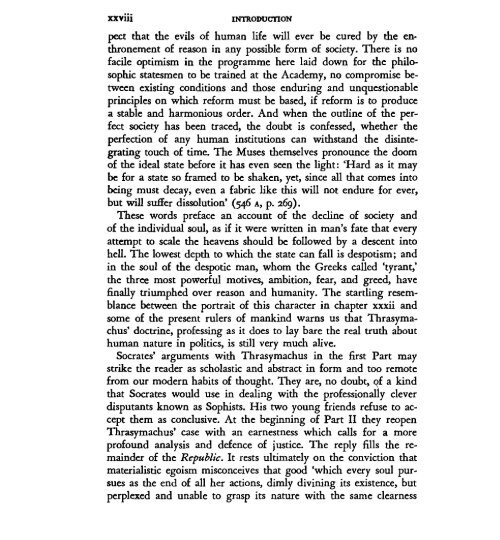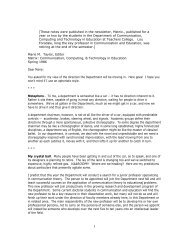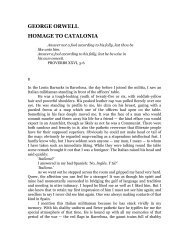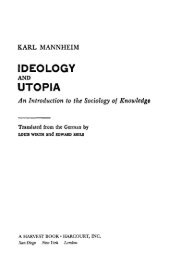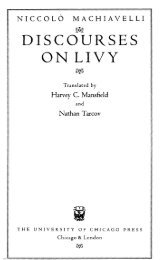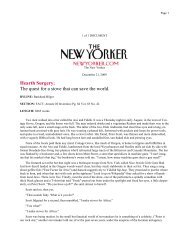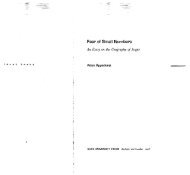THE REPUBLIC OF PLATO - Studyplace
THE REPUBLIC OF PLATO - Studyplace
THE REPUBLIC OF PLATO - Studyplace
You also want an ePaper? Increase the reach of your titles
YUMPU automatically turns print PDFs into web optimized ePapers that Google loves.
xxviii<br />
INTRODUCTION<br />
peet that the evils of human life will ever be cured by the en·<br />
thronement of reason in any possible form of society. There is no<br />
facile optimism in the programme here laid down for the philosophic<br />
statesmen to be trained at the Academy, no compromise between<br />
existing conditions and those enduring and unquestionable<br />
principles on which reform must be based, if reform is to produce<br />
a stable and harmonious order. And when the outline of the perfect<br />
society has been traced, the doubt is confessed, whether the<br />
perfection of any human institutions can withstand the disintegrating<br />
touch of time. The Muses themselves pronounce the doom<br />
of the ideal state before it has even seen the light: 'Hard as it may<br />
be for a state so framed to be shaken, yet, since all that comes into<br />
being must decay, even a fabric like this will not endure for ever,<br />
but will suffer dissolution' (546 A, p. 269).<br />
These words preface an account of the decline of society and<br />
of the individual soul, as if it were written in man's fate that every<br />
attempt to scale the heavens should be followed by a descent into<br />
hell. The lowest depth to which the state can fall is despotism; and<br />
in the soul of the despotic man, whom the Greeks called 'tyrant,'<br />
the three most powerful motives, ambition, fear, and greed, have<br />
finally triumphed over reason and humanity. The startling resemblance<br />
between the portrait of this character in chapter xxxii and<br />
some of the present rulers of mankind warns us that Thrasymachus'<br />
doctrine, professing as it does to lay bare the real truth about<br />
human nature in politics, is still very much alive.<br />
Socrates' arguments with Thrasymachus in the first Part may<br />
strike the reader as scholastic and abstract in form and too remote<br />
from our modern habits of thought. They are, no doubt, qf a kind<br />
that Socrates would use in dealing with the professionally clever<br />
disputants known as Sophists. His two young friends refuse to accept<br />
them as conclusive. At the beginning of Part II they reopen<br />
Thrasymachus' case with an earnestness which calls for a more<br />
profound analysis and defence of justice. The reply fills the remainder<br />
of the Republic. It rests ultimately on the conviction that<br />
materialistic egoism misconceives that good 'which every soul pursues<br />
as the end of all her actions, dimly divining its existence, but<br />
perplexed and unable to grasp its nature with the same clearness


